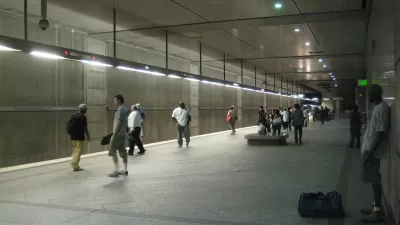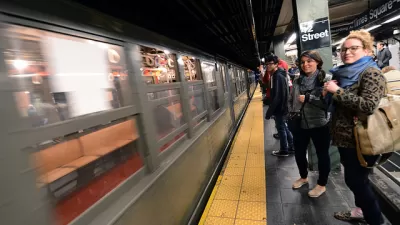While projects funded from the Highway Trust Fund are safe through May, discretionary programs run by DOT from annual appropriations must wait for Congress to approve a budget, which just got more complicated due to Obama's anti-ISIS funding request.
When President Obama requested on September 11 that Congress "authorize $500 million to train and equip pro-Western Syrian rebels battling Islamic State, often referred to as ISIS or ISIL," according to The Wall Street Journal, he complicated an already cloudy annual appropriation process for funding Department of Transportation (DOT) programs in fiscal year 2015.
In other words, "DOT appropriations run out in 19 days," according to Adam Snyder of Politico's Morning Transportation of September 12.
Stephen Lee Davis blogs on September 10 for Transportation for America that "we’re nearing the beginning of a new fiscal year on October 1, and Congress has failed to pass a budget to fund the government for the upcoming year."
The House and the Senate never resolved their disagreement over the annual appropriations for transportation for the upcoming fiscal year — one of many budget issues that they couldn’t agree on this year.
According to the chart in Davis' blog, there are seven programs that fall under appropriations for the Department of Transportation:
- Federal Aid Highways
- Transit Formula Grants
- Transit New & Small Starts
- TIGER [See Streetsblog's "US DOT Awards 72 TIGER Grants, But the Program Remains in Jeopardy"]
- Amtrak Operating
- Amtrak Capital
- High Speed Rail - which has $0 appropriated by Congress
Davis writes that Congress is likely to approve "a 'continuing resolution' to extend government funding through mid-December." He concludes by noting that "as long as the government is operating via a short-term budget, any programs that are discretionary at USDOT (i.e., not funded from the Highway Trust Fund) will likely face great uncertainty."
That means the next round of TIGER grants, money for new transit expansion (New and Small Starts), and passenger rail funding might see delays in when they’re awarded — creating even more funding uncertainty for states, metro areas and transit agencies.
[Hat tip to Jackie@ Climate Plan on T4A blog]
FULL STORY: Budget battles leave a cloud over transportation funding as lame duck session looms

Planetizen Federal Action Tracker
A weekly monitor of how Trump’s orders and actions are impacting planners and planning in America.

Chicago’s Ghost Rails
Just beneath the surface of the modern city lie the remnants of its expansive early 20th-century streetcar system.

San Antonio and Austin are Fusing Into one Massive Megaregion
The region spanning the two central Texas cities is growing fast, posing challenges for local infrastructure and water supplies.

Since Zion's Shuttles Went Electric “The Smog is Gone”
Visitors to Zion National Park can enjoy the canyon via the nation’s first fully electric park shuttle system.

Trump Distributing DOT Safety Funds at 1/10 Rate of Biden
Funds for Safe Streets and other transportation safety and equity programs are being held up by administrative reviews and conflicts with the Trump administration’s priorities.

German Cities Subsidize Taxis for Women Amid Wave of Violence
Free or low-cost taxi rides can help women navigate cities more safely, but critics say the programs don't address the root causes of violence against women.
Urban Design for Planners 1: Software Tools
This six-course series explores essential urban design concepts using open source software and equips planners with the tools they need to participate fully in the urban design process.
Planning for Universal Design
Learn the tools for implementing Universal Design in planning regulations.
planning NEXT
Appalachian Highlands Housing Partners
Mpact (founded as Rail~Volution)
City of Camden Redevelopment Agency
City of Astoria
City of Portland
City of Laramie





























